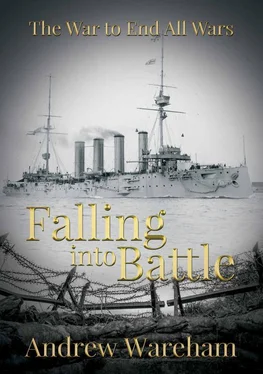“What about your efforts inside the harbour?”
Tyrwhitt listened and was gravely pleased.
“A full battalion of troops on the ship and more on a troop train, you believe. If not on a train, then a temporary barracks. Good work either way. Several hundreds of tons of stores; three merchantmen and four barges and a steam tug and a harbour gunboat; at least one gun emplacement. Excellent work, Captain Smallwood. I shall report to the Admiralty that your action was in the best traditions of the service. Inform your crew of my pleasure. I do not doubt that the newspapers will be full of your action tomorrow. They need something to crow about!”
“Bad news from France, sir?”
“The BEF is in helter-skelter retreat from the Belgian frontier, being pushed back towards Paris in the east. In the west of the country, in the industrial areas of Belgium, everything is confused but the BEF seems to be crawling back mostly. It seems as if they may be able to hold a north-south line a few miles inland of Dunkirk and Calais. The reports are unclear, but it looks as if cavalry and armoured cars are meeting in a series of skirmishes across western Belgium and Britain and Germany are trying to push infantry into the area to hold behind the fighting zone. The only reports seem to be coming in from bloody aeroplanes, of all things. Nothing from the ground forces – the cavalry is in a ‘war of movement’ and have no idea where anything is.”
“Never met a cavalryman who knew his arse from his elbow, sir. Unsurprising they’re lost!”
“No good asking the cavalry where they are, I agree, Smallwood. Pointless giving them maps and compasses because they none of them know which direction is north anyway.”
“I heard a rumour from Dover that the Household Cavalry turned up on their horses and asked where Calais was and wanted to know why there was a bloody great ditch in the way. Most upset when they were told they had to board ship!”
Tyrwhitt was not surprised – it sounded highly probable.
“All dressed up in their shiny tinplate, I expect, Smallwood. Hopeless!”
“Agreed, sir.”
“To business. Blackbird to the dockyard. Did any of your others take damage or losses?”
“Minor, sir, from small shells coming aboard. Robin lost two men and had four others wounded. No casualties on Curlew. Boats damaged to all three and holes to funnels. Nothing of vast significance.”
“Better get them to the yard, even so. The half-section down for the next week, it would seem; don’t want you patrolling with a single ship. I shall be taking the L Class boats out tomorrow with the cruisers to the Dogger Bank patrol. The other section of the H boats can go out tonight on coastal patrol. It appears there is activity which should be halted. Give your people local leave for seventy-two hours, Smallwood, then you can work the four up with the new owner for Blackbird. Take a break yourself – we may well be pushing things this next few months!”
“London, Mr Sturton?”
“I think so, sir. A couple of days in the bright lights!”
“And you, Mr Harker?”
“Chatham for me, sir – a chance to see my missus. Got married three months before I went out to China, sir. Seen her for the three weeks we had back in April and that’s been it, sir. Been thinking about moving her to Harwich, sir.”
Captain Smallwood approved – a wife’s place was near to her husband, if at all possible.
“What about you, Mr Dacres?”
“London, sir. The family should be in the Town House. Parliament is sitting so my father will likely be present – he does a deal of business with the government. We can take the same train, Sturton.”
Parrett was off to Ipswich, a quick train journey up the line, less than an hour to his parents’ house including the taxi, was pleased to be able to go home with a tale of action and derring-do.
“And the short journey for me, gentlemen, as far as Norwich. Back to the family and to face my mother with the admission that I am now promoted. She will have the eligible misses of the neighbourhood lined up for my delectation as soon as she realises that I am now permitted to take a wife. Be thankful you are but lieutenants, gentlemen!”
They laughed, dutifully.
“Poor old chap, sir! The captain must be feeling ancient these days, facing settling down in matrimony.”
“He’s only five years your senior, Sturton – it will be your turn before too many years have passed. Wartime brings accelerated promotion, you know. I shall be promoted inside six months, with a little luck. When that day comes, you will be considered for my job. Jimmy-The-One before you reach your majority, Sturton. Well feasible in a small ship – you know the basics that are required already. I can take you through the paperwork, it ain’t that complicated. A couple of months, less perhaps, and you will be well capable of stepping into my shoes as first lieutenant. The captain wants you to be able to do so.”
Simon was flattered and accepted the offer of tuition. The Navy seemed to assume that officers would pick up the administrative responsibilities by some sort of osmosis – they would see the bits of paper over the years and magically come to know what to do with them. He would be happy indeed to have the basics explained.
“Where are you going in London, Sturton?”
“Hotel. The Dorchester, I suppose, sir.”
“Not much fun, that. Come on home with me – there will be room in the Old Chap’s place. Dacres, by the way, not ‘sir’ on leave.”
“Thank you. It will be better than a hotel and trying to find something to do with myself.”
The offer could not be refused, and Simon found he had little desire to spend three days in effective solitude.
“Orphan, aren’t you, Sturton?”
“Both parents died in Canada when I was a baby. Neither set of grandparents had approved of the marriage and I was sent off to school young. Can’t remember anything other than school. Wasn’t a bad place. At least, they left me an income and the grandparents arranged for me to go to Dartmouth, so I was well looked after. Glad they put me into the Navy, in fact. I like the life. Better than the Army in wartime, that’s for sure!”
Dacres agreed.
“The Navy’s the place to be, Sturton. In the boats as well – the best place in the Navy.”
They took a taxi into Mayfair and were deposited outside the Dacres residence, a mansion in Simon’s eyes.
“Not small, Dacres, the Town House!”
“Got to make a show, you know. The family made a lot of money in Victorian times. Mining. Silver in the American West; gold in Canada; diamonds in South Africa – three generations with the Midas touch! I don’t know what my great-grandfather’s name was, but it seems very likely he changed it to the gentility of Dacres from something of the Russian Jewish persuasion. Not to worry – money becomes respectable after it’s been inherited a couple of times. My father picked up a baronetcy and my brother will turn that into a barony, I don’t doubt. All very couth! As third son, it don’t matter to me – except when I eventually enter the marriage stakes – a little gentility will go a long way there. What about you, Sturton? The surname is familiar.”
“My grandfather was Viscount Perceval, I am told. My father, who was second son, married a daughter of a banker, one Nathan Isaacs.”
“Minor family, the Percevals, but Isaacs is big in the City. Both are still alive, you know, Sturton.”
“My trustees told me that they have no wish to make my acquaintance, Dacres – I am as nearly misbegotten as makes no difference, it would seem.”
“Pity.”
Dacres led the way up three stairs to the big front door, which opened before he could knock. A butler stood politely but squarely in the entrance, blocking their path.
Читать дальше












